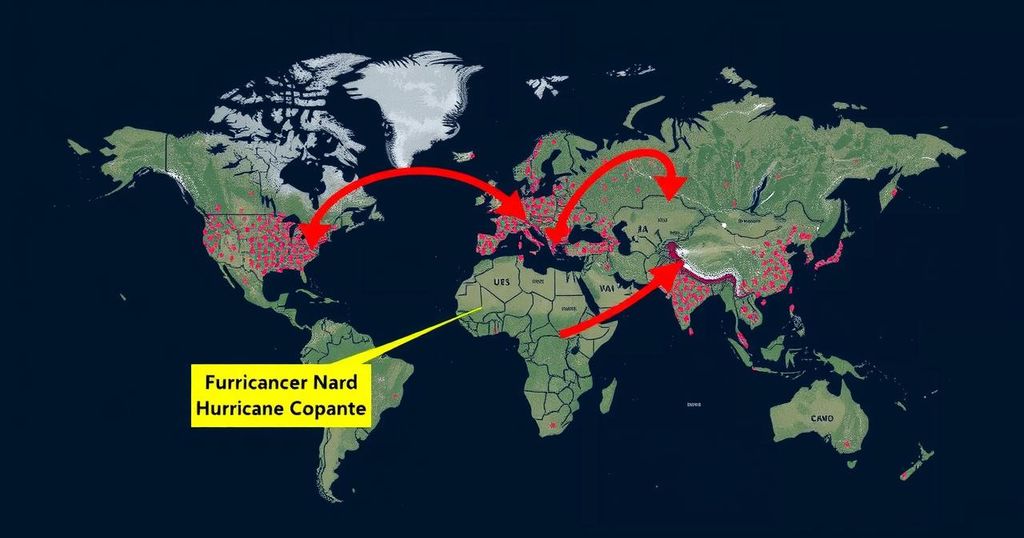Disinformation Campaigns by Foreign Powers Target U.S. Hurricane Relief Efforts

Russian, Chinese, and Cuban operatives have disseminated misinformation regarding U.S. hurricane relief efforts following Hurricanes Helene and Milton, according to a U.S. official. The misinformation includes claims that U.S. funds were diverted to foreign aid, with such narratives being propagated through AI-generated imagery and social media. The situation reflects broader concerns about foreign influence on American public opinion and the risks of misinformation leading to violence.
A United States official has reported that disinformation regarding hurricane relief efforts has been disseminated by operatives from Russia, China, and Cuba following the devastation caused by Hurricanes Helene and Milton. Intelligence sources indicate that a social media account linked to China utilized what appears to be an AI-generated image of Vice President Kamala Harris observing flood damage, along with a misleading sign asserting that financial support from the United States had been exclusively allocated to Ukraine, Israel, and Taiwan. Additionally, a state-owned Russian news agency reportedly shared an AI-generated image on the Telegram platform that depicted a flooded Disney World, while narratives suggesting that the U.S. government was withholding disaster-relief funds were circulated by Russian operatives. Cuban sources have also propagated themes consistent with those of Russia and China, alleging that American financial assistance to Israel and Ukraine detracted from domestic disaster relief efforts. This information suggests a coordinated effort by foreign powers to manipulate public perception regarding U.S. governmental responses to natural disasters. While much misinformation surrounding the hurricanes had, in fact, been spread by American sources—including notable figures such as billionaire Elon Musk—a United States official emphasized the impact of covert foreign activities in amplifying these false narratives. In turn, concerns have escalated that this disinformation could incite violence, as exemplified by the recent arrest of a North Carolina man who allegedly threatened FEMA employees assisting with hurricane relief. The dissemination of disinformation coincides with heightened foreign efforts to influence the upcoming presidential election, particularly by Russia, China, and Iran.
The spread of misinformation, particularly during times of crisis, poses significant challenges to governmental response efforts and public safety. Recent reports indicate increasing involvement of foreign powers in manipulating narratives surrounding U.S. domestic issues, especially in the wake of recent natural disasters like hurricanes. The active propagation of disinformation regarding disaster relief prioritizes the importance of maintaining accurate public discourse and countering external narratives that may hinder effective recovery efforts. The involvement of social media, particularly platforms owned by influential individuals, further complicates the management of misinformation. Moreover, the implications of such disinformation extend beyond immediate false narratives, as there are growing concerns that such actions could lead to violence and further distrust in governmental institutions. Thus, the current situation necessitates a strategic approach to counteracting misinformation from both domestic and foreign sources.
In summary, the intentional spread of misinformation about U.S. hurricane relief efforts by Russia, China, and Cuba highlights a concerning trend of foreign interference in domestic matters, particularly regarding natural disasters. This disinformation, amplified through various social media channels, poses risks not only to the public’s understanding of governmental actions but also to overall societal cohesion. The response from U.S. officials indicates a recognition of these threats, showcasing the need for heightened vigilance and proactive measures to address misinformation comprehensively.
Original Source: www.cnn.com








